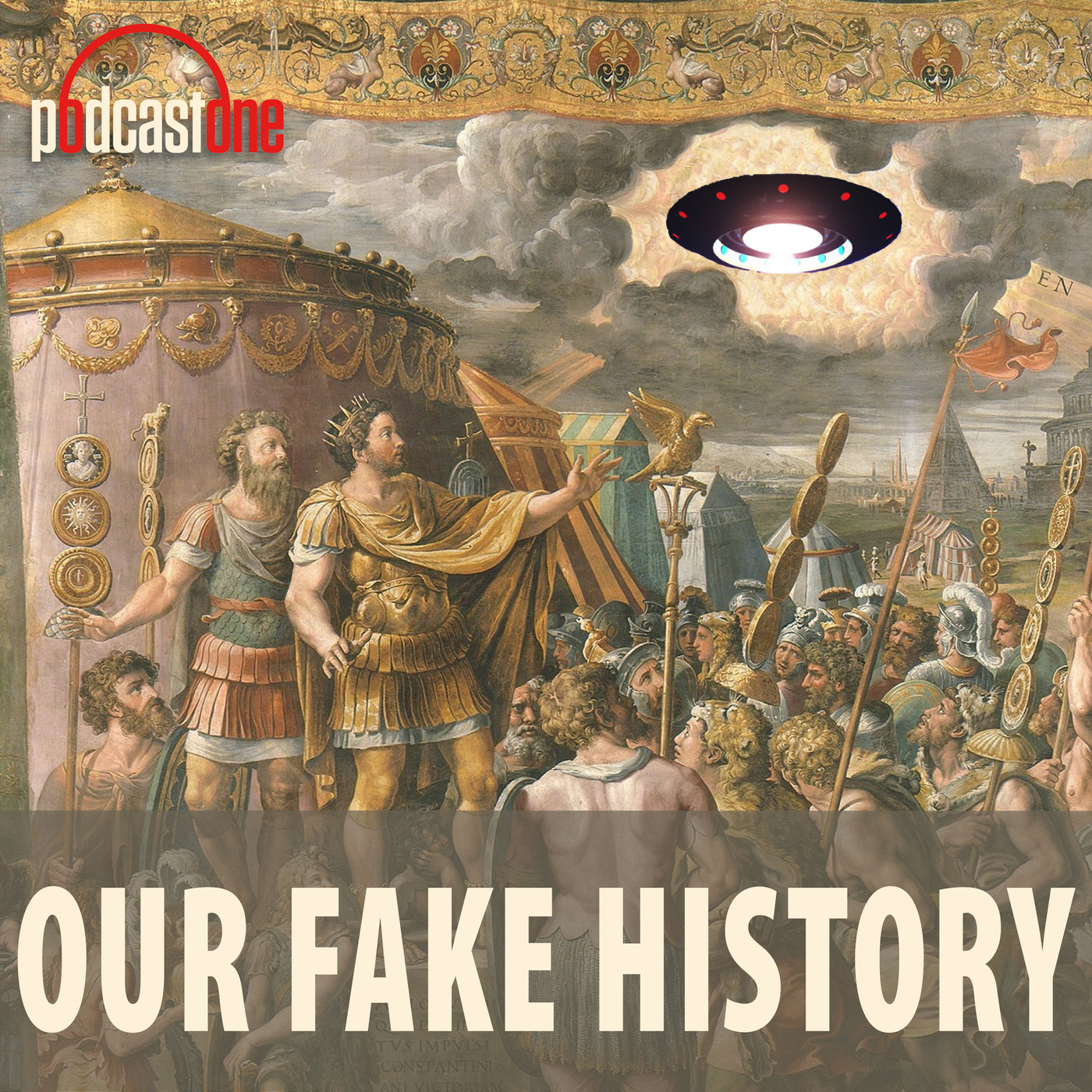Bonus Episode - Marble Thieves, Museums, and Dictators
In this bonus episode Sebastian answers questions from listeners about the recent series on the Parthenon Marbles. The host tangles with the ethics of repatriation requests from notorious dictators, the role of the Parthenon Marbles in inspiring the Greek Independence movement, and the path towards a true "universal museum." Sebastian also wrangles with the notorious "If I don't do it, somebody else will" argument that is often used to defend Lord Elgin. Tune-in and find out how Saddam Hussein, Dr. John, and a bunch of other history podcasts play a role in the story.
See Privacy Policy at https://art19.com/privacy and California Privacy Notice at https://art19.com/privacy#do-not-sell-my-info.
Press play and read along
Transcript
Speaker 1 At Grocery Outlet, we are turning up the cheer with your chance to win free groceries for a year. That's $6,000 in Grocery Outlet gift cards.
Speaker 1
From October through December, one lucky winner will score the grand prize each month. Plus, four more monthly winners get a $500 gift card.
Make your holiday shopping pay off.
Speaker 1 Download the Grocery Outlet app and scan your wow card every time you shop for your chance to win free groceries for a year. No purchase necessary, one entry per day, restrictions apply.
Speaker 1 Visit groceryoutlet.com for details.
Speaker 2 Grocery Outlet Bargain Market.
Speaker 3
Dictator repatriations, goodwill between nations, and tricky negotiations. All that and more on today's bonus episode of Our Fake History.
Hit the bonus theme.
Speaker 3 Hello, and welcome to this bonus episode of Our Fake History.
Speaker 3 My name is Sebastian Major, and normally this is the podcast where we explore historical myths and try to determine what's fact, what's fiction, and what is such a good story that it simply must be told.
Speaker 3 But on these bonus shows, I like to take questions from my wonderful patrons and any other listeners who have sent me an email about one of our recent series.
Speaker 3 If you've been following this podcast closely, then you know that we recently completed a series on the Parthenon marbles, those controversial museum objects originally from the Acropolis in Greece that currently reside in the British Museum in London.
Speaker 3 Now, when I started researching the history around these sculptures, I was amazed by just how many historical myths are associated with them.
Speaker 3 Now, I have a personal theory that I cannot prove that part of the reason why these myths have proliferated is because the question of where the Parthenon marbles should reside has become a perennial debate topic in Britain.
Speaker 3 If you are a young person at the high school level in Britain, I have a feeling that your teachers set that question in front of you to practice your debating skills.
Speaker 3 British listeners, please weigh in. At school, were you asked about the Parthenon marbles? Did you have to do mock debates about that topic?
Speaker 3 I ask because as a teacher who once upon a time taught debating at the grade 11 and 12 level, I've seen my students go hunting for things that they think will pack a rhetorical punch in their debate.
Speaker 3 And sure enough, they find historical myths.
Speaker 3 Stories about Greek soldiers delivering bullets to the Turks to save the Parthenon, or the Turks grinding down statues to make cement for their homes, they land well in a high school debate format, So I could see how they get firmly lodged in the popular consciousness.
Speaker 3 It's tough when questions like these become the means through which we teach rhetoric.
Speaker 3 Now, I don't want to sound horribly pretentious here, so you know, stop me if I'm being ridiculous, but the famous Greek philosopher Plato used to worry that the skill of sophistry, that is, the art of argumentation, could often get in the way of people perceiving justice or the good.
Speaker 3 And honestly, the longer I have lived, the more I think he had a point.
Speaker 3 The fact that debates around the marbles have led to confusion about the history of the marbles, I think is an amazing example of this.
Speaker 3 So I guess we have to doff our caps to the Greeks once again, because I think Plato was right about this one.
Speaker 3
Okay, let's get to your questions. As always, I gather most of these questions from the Patreon community.
If you are a patron, then you can participate in our patrons-only chats.
Speaker 3 I've got a chat thread there for every bonus episode. So if you have a question, that's the best place to put it.
Speaker 3 But if you are not a patron, I will consider your questions if you email them to me at ourfakehistory at gmail.com.
Speaker 3 But of course, my patrons are very special to me, so I always look there first.
Speaker 3 And sure enough, our first question today comes to us from Rob on Patreon. Rob writes,
Speaker 3 One of my high school history teachers discussed the theft of the marbles and the request to return them.
Speaker 3 His comment was that should they be returned, then all the Babylonian objects would have to be returned to the, as of then still in power, regime of Saddam Hussein.
Speaker 3 To be clear, the teacher was not saying Hussein would destroy them, just that Hussein was an objectionable ruler, being a dictator and all.
Speaker 3 I don't know if I bought the argument at the time, but what are your thoughts? Are there some artifacts that could be said to be protected when they are in other countries?
Speaker 3 Should modern geopolitics be a consideration in the decision to repatriate items? Would there be a requirement and case to return items even if the regime in power was expected to destroy them?
Speaker 3 Thank you, Rob, for that fascinating question. I really had to think long and hard about this one.
Speaker 3 Now, first, it's worth knowing that many of the Mesopotamian objects that are in museums around the world were gathered much in the same way that Lord Elgin gathered the Parthenon marbles from Greece.
Speaker 3 The archaeologists who were working in that part of the world were granted firmons or official permissions from the Ottoman government to remove objects.
Speaker 3 And much like in Elgin's case, these firmons were usually rather permissive.
Speaker 3 So once again, we have the same problem, where you have the Ottoman Empire, who were an occupying colonial force, giving out permissions to harvest other people's cultural heritage.
Speaker 3 So, what is the ethical thing to do? if someone like Saddam Hussein was to make a formal request for the return of Mesopotamian artifacts to Iraq.
Speaker 3 Now, we know that Hussein was actually quite interested in Mesopotamian artifacts. His regime rebuilt a number of ancient Mesopotamian cities and turned them into tourist destinations.
Speaker 3 They were also used for propaganda purposes by the Hussein regime.
Speaker 3 Now, Saddam Hussein never made any official requests to have any objects returned to Iraq from the British Museum or any other museum, but it's not out of the question that that day may have come had Hussein's regime continued to exist.
Speaker 3 In my opinion, the Iraqi people can make a strong case that objects that were taken from their territory during the Ottoman era should be returned.
Speaker 3 But, and this is a big but, I don't think any government or any institution is required to deal with someone like Saddam Hussein.
Speaker 3 The repatriation of museum objects is all about international cooperation, goodwill between peoples, and a rules-based international order.
Speaker 3 I think it's safe to say that while Saddam Hussein was in power, Iraq was not really participating in that international community.
Speaker 3 If your nation is in the position where you are officially condemning human rights violations in another country, I don't think you necessarily are in a position where you have to start talking about the repatriation of objects.
Speaker 3 There are bigger fish to fry.
Speaker 3 I think it's reasonable to say that repatriation should only happen when two nations are on friendly terms.
Speaker 3 This is why I think it was completely unfair for Robb's history history teacher to compare the request made by the Greeks for the Parthenon sculptures to a hypothetical request made by Saddam Hussein for Mesopotamian objects.
Speaker 3
Greece is a democracy that is allied with Great Britain. It's very much a friendly nation.
They also went through the United Nations and UNESCO to make their request. Greece did it the right way.
Speaker 3 Now, interestingly, since the fall of Saddam Hussein's regime and the formation of the new Iraqi Republic, there has been a movement to have Mesopotamian objects returned to the country.
Speaker 3 In fact, just a few months ago, in May of 2025, the Metropolitan Museum of Art in New York City returned a number of Sumerian and Babylonian objects to Iraq.
Speaker 3 In this case, the change in government in Iraq really mattered. Iraq is now a democracy that was able to engage on friendly terms with the Metropolitan Museum of Art.
Speaker 3 In this context, I think the Met did the right thing.
Speaker 3 So, I guess my personal take on this is that a case for the repatriation of museum objects can only really happen if the two nations in question have normalized, friendly, diplomatic relations.
Speaker 3 Like Greece and Britain, for example.
Speaker 3 If the two nations have a good diplomatic relationship and the case for repatriation is strong, then it should happen.
Speaker 3 Those are my thoughts.
Speaker 3 All right, the next question also comes from the Patreon community.
Speaker 3 Davy C. writes, Great episode.
Speaker 3 Question, did Elgin's treatment of the Parthenon and the Ottomans' seeming permission contribute to the nationalist feelings that inspired the Greek War of Independence soon after?
Speaker 3 The timing and symbolism seems uncanny. Thanks for the question, Davey.
Speaker 3 That is an interesting thought. Now, I could not find any evidence that directly linked Elgin's treatment of the Parthenon to a swell in Greek nationalist feeling.
Speaker 3 As I mentioned in part two of the series, it's difficult to get a read on exactly what the Greek national sentiment was in 1801 when Elgin started removing marbles from the Parthenon.
Speaker 3 By the 1820s, we find more Greek voices in the historical record saying loudly that they are not happy about what has happened to the ancient Greek antiquities in their country.
Speaker 3 British members of parliament even make reference to the fact that Greeks will one day want the marbles back.
Speaker 3 But did Lord Elgin's denuding of the Parthenon help inspire nationalistic feelings in Greece?
Speaker 3
I don't know. I don't think so, honestly.
There's just not good evidence of it.
Speaker 3 What we do know for sure is that the Greek nationalist literature that was being produced in the early 19th century is very anti-Turkish.
Speaker 3 Greek nationalist writers argued that Greek culture and language had been suppressed after hundreds of years of Turkish occupation and needed to come roaring back.
Speaker 3 These revolutionaries were laser-focused on what they believed was Turkish oppression. For them, the Turks were the main enemy.
Speaker 3 As such, the excesses of British lords or Napoleon's generals or any other Europeans who may have been in Greece at the time were less of a focus.
Speaker 3 So, if anyone inspired Greek nationalism in the early 19th century, it was the Ottoman Empire and not really Lord Elgin.
Speaker 3 All of this is to say that the removal of the Parthenon sculptures was not a driving force in the early independence movement.
Speaker 3 But once Greece was independent, they started asking about the Parthenon sculptures.
Speaker 2 It's time your hard-earned money works harder for you. With the WealthFront Cash Account, your uninvested cash earns a 3.75% APY, which is higher than the average savings rate.
Speaker 2 No account fees, no minimums, and free instant withdrawals to eligible accounts anytime. Join over a million people who trust WealthFront to build wealth at wealthfront.com.
Speaker 2 Cash account offered by Wealthfront Brokerage LLC, member FINRA SIPC, and is not a bank. APY on deposits as of September 26th, 2025, is representative, subject to change, and requires no minimum.
Speaker 2 Funds are swept to program banks where they earn the variable APY.
Speaker 4 The questions start early.
Speaker 2 How do I know when he's full?
Speaker 3 Do babies hold grudges?
Speaker 4
That's why we make one formula that feels right right away. Backed by Breast Milk Science and built for babies' brains, bellies, and beyond.
Learn more at buyheart.com.
Speaker 3 Our next question also comes to us from Patreon. Michael writes,
Speaker 3 I remember hearing on the Stuff You Missed in History class podcast episodes on this topic that Lord Elgin did keep the Parthenon sculptures at his estate for almost a decade before the British government bought the collection.
Speaker 3 He was also allegedly broke, which was part of his public case to get the the government to buy the collection.
Speaker 3 Thanks for the question, Michael. So this question concerns the correction that I made in part two.
Speaker 3 I spent some time talking about how no sculptures were actually sent to Lord Elgin's home in Scotland.
Speaker 3 Pieces of marble collected from historical sites around the Mediterranean were, but not specifically the the Parthenon sculptures.
Speaker 3 So what exactly were the hosts of Stuff You Missed in History Class talking about? Well, first, shout out to Stuff You Missed in History Class. They are one of the original history podcasts.
Speaker 3 Before I started this show, I listened to them all the time. So big ups to Stuff You Missed in History Class.
Speaker 3 But on that show, they did not make an important distinction.
Speaker 3 When the Parthenon sculptures arrived in Britain, they were sent to a house that had been purchased in London by Lord Elgin specifically for the display of the marbles.
Speaker 3 This house was originally opened to British artists who could come and take a look at the marbles and then eventually ran as a kind of private museum.
Speaker 3 So, it is true that Lord Elgin shipped the marbles to a house that he owned, but it was a house that was always meant to be run as a type of private museum.
Speaker 3 Why does this distinction matter? Well, Elgin often gets accused of destroying one of the world's most important historic buildings simply to decorate his home.
Speaker 3 I definitely dip my toe in that historical myth when I was making this series. That's not exactly correct.
Speaker 3 He brought those sculptures to London because he thought it would make the English arts scene better.
Speaker 3
They were never intended just for his private enjoyment. Are we splitting hairs here? Maybe.
But Lord Elgin's defenders get very angry about this point. So it's important that we get this right.
Speaker 3 As for Lord Elgin's financial situation when he was selling the marbles to the British government, that too is disputed.
Speaker 3 Now, I had also learned that he was basically broke at the time that he was selling the marbles, which is one of the reasons why he really needed the British government to buy them.
Speaker 3 But during my research, I learned that Lord Elgin's dire financial situation may have been exaggerated.
Speaker 3 In fact, the Lord may have even exaggerated it himself to drum up sympathy from the members of parliament who had to sign off on buying the marbles.
Speaker 3 Some researchers believe that he was not as broke as is sometimes claimed.
Speaker 3 Now, because there was different stuff that I was reading about this, I kind of tiptoed around this in the introduction to part two.
Speaker 3 But yes, some say that Elgin was broke, others contest that fact.
Speaker 3 I'll say that it remains a point of debate.
Speaker 3
The next question comes to us from Mr. Ethan Johnson.
Ethan writes, Hey Sebastian, cool episode on the Elgin marbles.
Speaker 3 Some months ago, Trevor Cully of the History of Persia podcast made a comment about the British Museum's practices, which I think is very relevant to this episode.
Speaker 3 He then quotes from Trevor, quote, I've said for ages that the British Museum's high-profile refusal to coordinate with countries asking for their stuff back has set a terrible precedent for all museums.
Speaker 3 There is a really cool opportunity in that debate to normalize more impressive long-term exchange programs.
Speaker 3 Instead, we have this weird two-tiered system of colonial powers having a disproportionate amount of quote-unquote world history in their museums, while other countries' museums are often significantly more localized.
Speaker 3 End quote. Ethan continues, what's your opinion regarding this concept of cultural exchange? Have you ever discussed the larger political situations regarding curation with people who work at museums?
Speaker 3 Thanks so much, Ethan.
Speaker 3
First, I should give a shout out to Trevor from the History of Persia podcast. I think Trevor and I have both appeared at the Intelligent Speech Conference.
So big ups to Trevor.
Speaker 3
Big ups to the History of Persia podcast. To answer your question, Ethan, yes, I think that Trevor has an excellent point there.
I too would like to see more sharing between museums around the world.
Speaker 3 Now, I know that museums already do this. There is a lot of sharing that happens, but I think Trevor makes an excellent point about the the two-tiered nature of museums.
Speaker 3 Places like the British Museum and the Louvre and the Met can make this claim to being world museums, but it's only because they were able to create their collections at the height of their respective empires.
Speaker 3 At the end of part two of the Parthenon Marbles series, we talked about the concept of the universal museum.
Speaker 3 It seems a little sad that only like three or four places in the world could really be universal museums. I'm with Trevor.
Speaker 3 A robust system of sharing of interesting objects between museums around the world would be an excellent step towards the creation of universal museums everywhere.
Speaker 3 And this keeps bringing me back to the point I've been harping on, which is that this type of cooperation and sharing can only happen if there's goodwill between nations, right?
Speaker 3 You have to engender a friendly sharing environment.
Speaker 3 And if one nation feels like their objects are being held captive by another nation, that does not create the type of community that would allow for universal museums to flourish all over the world.
Speaker 3
This is why I favor repatriation in many cases. It helps build trust and friendship between groups of people.
If you want universal museums, you need trust and friendship.
Speaker 3 Now, the second part of your question is if I've ever discussed the larger political situations regarding curation with people who work at museums. The short answer is yes.
Speaker 3 It actually comes up all the time with my friends. I live in Ottawa and I have friends that work at a number of big institutions here in Canada's capital.
Speaker 3 One very good friend of mine is a curator at one of the museums here in town.
Speaker 3 A big part of her job has become about the ethical return of objects that were improperly taken, mostly from Canadian Indigenous communities.
Speaker 3 She works very closely with experts from these communities to establish the provenance of various objects and then return them to their place of origin.
Speaker 3 This is often a difficult and painful process that involves unearthing some very nasty moments in our country's history.
Speaker 3 But anytime I've spoken to her about it, she's always emphatic that the process is incredibly important because it begins the healing process and helps rebuild trust between these communities that were wronged and institutions like Canadian museums.
Speaker 3 Now, sometimes these cases are very clear. There's an object, oftentimes these are ceremonial masks and other ritual objects that were obviously improperly taken and their provenance is very obvious.
Speaker 3 But there are other objects where the provenance is less clear.
Speaker 3 There have been some objects that she's worked with where more than one indigenous group claims that it came from their traditional territory. And that's where things get very tricky.
Speaker 3 In those cases, claims need to be adjudicated, historical research needs to be done, traditional knowledge keepers need to be consulted, and a long and delicate process needs to be undertaken so the right people get the right objects.
Speaker 3 It's a tricky job, but it's the right thing to do, in my humble opinion.
Speaker 3 Okay, I think we've got time for one more question. This one comes to us from Gary.
Speaker 3 Gary writes, Sebastian, I'm pretty sure that if the Brits had not taken the marbles when they did, the Nazis would have almost certainly got them during the World War II occupation.
Speaker 3 I don't believe I heard you mention this. Did you dismiss it or just never think of it? Warmest regards, Gary.
Speaker 3 All right, thanks for the question, Gary.
Speaker 3 This idea actually gets brought up quite a lot by defenders of Lord Elgin or folks who think that the marbles should remain in Britain.
Speaker 3 They like to point out that if Lord Elgin had not taken the marbles from the Parthenon, perhaps the French under Napoleon would have done the same thing.
Speaker 3 Or, who knows, in the 1940s, the Nazis may have cut into the building and taken the sculptures for themselves.
Speaker 3 To be honest, Gary, I do not care for this argument. First, it's impossible to prove a counterfactual.
Speaker 3 If they had been left there, would they have been taken by some other group of people? Maybe, but maybe not.
Speaker 3
We don't know. We can't know.
Now, I wouldn't put anything past the Nazis. They were the Nazis, after all.
I mean, amongst their long list of horrific crimes, one of them was art theft.
Speaker 3 They stole stuff from around the European continent, quite famously.
Speaker 3
But ironically, if the Nazis had stolen the Parthenon sculptures, they would probably already be back in Greece. Because after the war, Nazi loot got returned.
Most of it, anyway.
Speaker 3 Now, the fact that the Nazis might have stolen the Parthenon sculptures in the 1940s does not help justify Lord Elgin's actions in 1801.
Speaker 3 There's no way he could have known what people would have done to that building hundred and forty
Speaker 3 years later.
Speaker 3 You could also make the argument that what Lord Elgin did to the Parthenon was uniquely bold.
Speaker 3 Would anyone else have gone so far as to saw into the marble to tear sculptures off of the high pediments of that building?
Speaker 3 Maybe, but what a thing to do, right?
Speaker 3
I call this argument the, if I don't do it, somebody else will argument. I don't know if you folks know the Dr.
John song, Such a Night. He plays it in the last waltz.
The real heads know.
Speaker 3 Anyway, in the song, the lascivious narrator is eyeing his best friend's girlfriend, and he starts fantasizing about stealing the girl away from his best friend.
Speaker 3 And the chorus is: well, if I don't do it, somebody else will.
Speaker 3 But part of the fun of the song is that we're all in on the joke that it's a bad justification.
Speaker 3 Right?
Speaker 3 Right?
Speaker 3 I have to steal my best friend's girlfriend. I have to take these priceless sculptures because if I don't, somebody else will.
Speaker 3 In fact, hundreds of years from now, now, someone else might get the idea to take these sculptures away. So I better just grab them up right now.
Speaker 3 Give me a break.
Speaker 3 Anyway, Gary, I do appreciate your question, but yes, I have dismissed that particular argument.
Speaker 3 Okay.
Speaker 3
That's all for this week. Join us again in just one week's time when there will be an all-new episode of Our Fake History.
We're coming into October, so I got a little something spooky for you.
Speaker 3 In the meantime, if you want to be part of our Patreon community, go to patreon.com slash our fake history. Look at a level of support that works for you.
Speaker 3 You get an ad-free feed and a ton of extra episodes. And I am now officially taking suggestions for the next patrons only extra episode.
Speaker 3
I will be opening up a new chat for suggestions for that episode. So patrons, go ahead, give me your suggestions there.
I know we've got an old thread of suggestions.
Speaker 3 I'm just going to open up a brand new one so I know which stuff is coming in fresh.
Speaker 3 After the patrons have had some time to give me suggestions, I take my five favorite suggestions and then the patrons get to vote on which one they want me to research for an upcoming patrons only extra.
Speaker 3 So it's a great time to be a patron. So get on board at patreon.com slash ourfake history.
Speaker 3 I will also remind you that I am going to Greece. Yes, the Our Fake History community is going to Greece in one year's time, September of 2026, with John Shore's travel.
Speaker 3 If you want to explore the historical sites of Greece with yours truly, then please check out the trip at johnshorestravel.com slash upcoming trips or just go to ourfakehistory.com and follow the link to the trip.
Speaker 3 It's going to be an amazing time. If you book, please use the code OFH so they know that I sent you.
Speaker 3
If you ever want to get in touch with me, hit me up with an email at ourfakehistory at gmail.com or find me on social media. I'm on Instagram at OurFake History.
I'm on TikTok at OurFake History.
Speaker 3
I'm on Blue Sky at OurFake History. I'm on YouTube at OurFake History.
I'm everywhere at OurFake History. So send me a message.
Oh, I'm also on Facebook, facebook.com/slash our fake history.
Speaker 3 As always, the theme music for our show comes to us from Dirty Church. Check out more from Dirty Church at dirtychurch.bandcamp.com.
Speaker 3
All the other music you heard on the show today was written and recorded by me. My name is Sebastian Major.
And remember, just because it didn't happen doesn't mean it isn't real.





